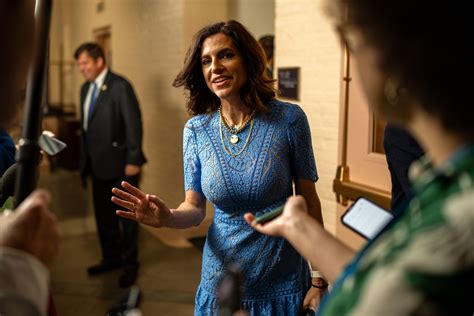
South Carolina Representative Nancy Mace’s office allegedly orchestrated a network of fake social media accounts and bots to artificially inflate her public image, according to a new report. The report, detailed by FITSNews, accuses Mace and her staff of creating and managing these accounts to amplify her presence and engagement online.
Report Alleges Nancy Mace’s Office Used Fake Accounts to Boost Online Profile
A bombshell report alleges that Representative Nancy Mace’s office engaged in a coordinated effort to create and operate a network of fake social media accounts and bots, designed to artificially inflate her online popularity and engagement. The report, published by FITSNews, a South Carolina-based news outlet, claims that Mace and her staff were directly involved in managing these accounts, using them to amplify her message, attack political opponents, and manipulate public perception. The allegations raise serious ethical and legal questions about the conduct of a sitting member of Congress and the potential misuse of taxpayer-funded resources.
The FITSNews report provides a detailed account of the alleged scheme, citing anonymous sources, leaked documents, and social media analysis. The report claims that the fake accounts were used to boost Mace’s follower count, generate likes and comments on her posts, and spread positive narratives about her accomplishments. The accounts were also allegedly used to target Mace’s political rivals, spreading misinformation and engaging in online harassment.
According to the report, the operation was allegedly overseen by key members of Mace’s staff, who were responsible for creating and managing the fake accounts. The report also alleges that Mace herself was aware of the scheme and may have even been involved in directing it.
The allegations come at a critical time for Mace, who is facing a primary challenge from several Republican candidates. The report could damage her reputation and undermine her credibility with voters, potentially jeopardizing her chances of reelection.
Details of the Alleged Bot Network
The FITSNews report outlines several specific examples of the alleged fake accounts and bot activity. The report claims that many of the accounts were created using generic names and profile pictures, and that they often posted repetitive or nonsensical content. The accounts also allegedly exhibited suspicious patterns of activity, such as liking and sharing Mace’s posts at the same time and engaging in coordinated attacks against her political opponents.
The report also identifies several specific accounts that it claims were used to spread misinformation and engage in online harassment. These accounts allegedly targeted Mace’s primary opponents, accusing them of being “RINOs” (Republicans In Name Only) and spreading false information about their voting records.
The report also alleges that Mace’s office used paid services to purchase fake followers and engagement for her social media accounts. This practice is a violation of social media platforms’ terms of service and can be considered a form of online fraud.
Ethical and Legal Implications
The allegations against Mace raise serious ethical and legal questions. If true, the allegations would constitute a violation of House ethics rules, which prohibit members of Congress from using their office for personal gain or engaging in conduct that reflects poorly on the House.
The allegations could also potentially violate federal laws, such as the Computer Fraud and Abuse Act, which prohibits unauthorized access to computer systems. Additionally, the use of taxpayer-funded resources to create and operate fake social media accounts could be considered a misuse of public funds.
The House Ethics Committee is likely to investigate the allegations against Mace. If the committee finds that she violated House ethics rules, she could face a range of sanctions, including a reprimand, censure, or even expulsion from the House.
Mace’s Response
As of the publication of the FITSNews report, Mace’s office has not issued an official statement addressing the allegations directly. Initial responses have been dismissive, referring to the report as politically motivated. However, the seriousness of the allegations suggests that a more comprehensive response will be necessary.
The lack of a strong denial could further damage Mace’s credibility and fuel speculation about the truthfulness of the allegations. It remains to be seen how Mace will respond to the report and whether she will cooperate with any investigations that may be launched.
Political Context
The allegations against Mace come at a time of heightened political polarization and increased scrutiny of social media manipulation. The use of fake accounts and bots to influence public opinion has become a major concern in recent years, particularly in the context of elections.
The allegations against Mace could further fuel the debate about the need for greater regulation of social media and stricter enforcement of laws against online fraud and manipulation.
Impact on Mace’s Reelection Campaign
The allegations against Mace could have a significant impact on her reelection campaign. The report could damage her reputation and undermine her credibility with voters, potentially leading to a loss in the primary election.
Mace is already facing a tough primary challenge from several Republican candidates who are running to her right. The allegations could give these candidates an additional advantage by providing them with ammunition to attack Mace’s character and integrity.
It remains to be seen how the allegations will ultimately affect the outcome of the election. However, the report has undoubtedly created a major challenge for Mace and her campaign.
Expert Opinions and Analysis
Political analysts and experts have weighed in on the allegations against Mace, offering their perspectives on the potential implications for her career and the broader political landscape.
Some analysts have noted that the allegations are particularly damaging because they involve a member of Congress who is already facing scrutiny for her voting record and her relationship with former President Donald Trump.
Other analysts have cautioned against jumping to conclusions before all the facts are known. They have noted that the FITSNews report relies heavily on anonymous sources and that it is important to consider the possibility that the allegations are politically motivated.
Conclusion
The allegations against Representative Nancy Mace are serious and could have significant consequences for her career and the broader political landscape. The FITSNews report provides a detailed account of the alleged scheme, citing anonymous sources, leaked documents, and social media analysis.
It remains to be seen how Mace will respond to the report and whether she will cooperate with any investigations that may be launched. The House Ethics Committee is likely to investigate the allegations, and Mace could face a range of sanctions if she is found to have violated House ethics rules.
The allegations against Mace underscore the growing concerns about the use of fake accounts and bots to manipulate public opinion. The debate about the need for greater regulation of social media and stricter enforcement of laws against online fraud and manipulation is likely to intensify in the wake of these allegations.
Further Investigation
The allegations detailed in the FITSNews report warrant a thorough and impartial investigation. Such an investigation should focus on verifying the authenticity of the evidence presented, identifying the individuals involved in the alleged scheme, and determining the extent of Mace’s knowledge and involvement.
The investigation should also consider the potential legal and ethical violations that may have occurred. If Mace is found to have engaged in wrongdoing, she should be held accountable for her actions.
The outcome of the investigation could have a significant impact on Mace’s career and the broader political landscape. It could also serve as a deterrent to other politicians who may be tempted to engage in similar tactics.
The Broader Context of Social Media Manipulation in Politics
The allegations against Nancy Mace come amid a growing awareness and concern about the use of social media manipulation in politics. The proliferation of fake accounts, bots, and disinformation campaigns has made it increasingly difficult for voters to discern the truth and make informed decisions.
Social media platforms have taken some steps to address the problem, such as banning fake accounts and labeling misleading content. However, these efforts have been largely ineffective, and the problem of social media manipulation continues to pose a serious threat to democracy.
The allegations against Mace highlight the need for more comprehensive and effective measures to combat social media manipulation. These measures should include stricter regulation of social media platforms, increased enforcement of laws against online fraud and manipulation, and greater public awareness about the risks of disinformation.
The Role of Media Outlets in Reporting on Allegations of Misconduct
The FITSNews report on the allegations against Nancy Mace raises important questions about the role of media outlets in reporting on allegations of misconduct. Media outlets have a responsibility to investigate and report on allegations of wrongdoing by public officials. However, they also have a responsibility to ensure that their reporting is fair, accurate, and unbiased.
In the case of the FITSNews report, some critics have questioned the outlet’s credibility and impartiality. FITSNews is known for its conservative political leanings, and some have suggested that the report is politically motivated.
However, the seriousness of the allegations against Mace warrants further investigation, regardless of the source of the allegations. It is important for other media outlets to independently verify the facts and report on the story in a fair and unbiased manner.
Potential Impacts on Future Elections
The allegations against Nancy Mace could have far-reaching implications for future elections. The allegations could further erode public trust in government and undermine confidence in the integrity of the electoral process.
The allegations could also lead to increased scrutiny of social media activity by political candidates and campaigns. This could make it more difficult for candidates to use fake accounts and bots to manipulate public opinion.
Ultimately, the allegations against Mace could serve as a wake-up call for voters and policymakers alike. They could prompt greater awareness about the risks of social media manipulation and lead to more effective measures to protect the integrity of elections.
FAQ Section
1. What are the main allegations against Nancy Mace?
The main allegation is that Nancy Mace and her staff created and managed a network of fake social media accounts and bots to artificially inflate her online presence, boost engagement on her posts, attack political opponents, and spread positive narratives about her accomplishments. This allegedly includes purchasing fake followers and using accounts with generic profiles to spread misinformation.
2. What is FITSNews, and why is it relevant to this story?
FITSNews is a South Carolina-based news outlet that published the report detailing the allegations against Nancy Mace. It’s relevant because it’s the primary source of the information, presenting leaked documents, anonymous sources, and social media analysis as evidence of the alleged scheme. While FITSNews has a known conservative leaning, the seriousness of the allegations necessitates scrutiny regardless of the source.
3. What are the potential legal and ethical consequences for Mace if the allegations are true?
If the allegations are true, Mace could face several consequences. Ethically, she could be found in violation of House ethics rules, leading to reprimand, censure, or even expulsion from the House. Legally, she could potentially violate the Computer Fraud and Abuse Act, and the use of taxpayer-funded resources for the alleged activities could be considered a misuse of public funds.
4. How has Nancy Mace responded to the allegations?
As of the initial report, Mace’s office had not issued an official statement directly addressing the allegations. Initial responses were dismissive, characterizing the report as politically motivated. However, a comprehensive response addressing the specific claims is expected.
5. How might these allegations affect Mace’s reelection campaign?
The allegations could significantly damage Mace’s reelection campaign. They could erode her credibility with voters, especially as she faces a primary challenge. The report provides ammunition for her opponents to attack her character and integrity, potentially impacting the outcome of the primary election. Detailed Expansion of the Article
The Genesis of the Allegations: The FITSNews Report in Detail
The FITSNews report forms the bedrock of this controversy. It is crucial to understand the methodology and the specifics presented in the report to properly evaluate the gravity of the accusations. The report claims to have amassed evidence from several sources, including anonymous individuals purportedly within Mace’s office or close to her campaign, leaked internal communications (the veracity of which remains unconfirmed by independent sources), and a meticulous analysis of social media account activity.
The report delves into the characteristics of the alleged fake accounts. It claims that these accounts frequently use stock photos or generic avatars, and their usernames often lack individuality, suggesting a manufactured origin. The content they generate is characterized as repetitive and unoriginal, often consisting of generic praise for Mace or regurgitated talking points. Furthermore, the timing and coordination of their activity – mass liking, commenting, and sharing of Mace’s posts within short intervals – are cited as indicators of bot-like behavior. The report also claims that some of these accounts have been used to amplify negative information about Mace’s political opponents, engaging in online harassment and spreading misleading claims. Specific examples of such behavior are provided, though the anonymity of the sources makes independent verification difficult.
The report also alleges the use of paid services to artificially inflate Mace’s follower counts and engagement rates. These services, readily available online, often utilize bot networks or click farms to generate fake activity, giving the illusion of greater popularity and influence. Evidence of such purchases is not explicitly presented in the report, but the claim is based on the observed patterns of social media activity.
Ethical Considerations: Violations of House Rules and Public Trust
The ethical implications of these allegations are significant. Members of the U.S. House of Representatives are bound by a code of ethics that emphasizes integrity, honesty, and adherence to the law. Using public resources to create and manage fake social media accounts would constitute a clear violation of these principles. It would also represent a breach of the public trust, as it involves deceiving constituents about the level of support for a particular politician or policy.
House rules specifically prohibit members from using their official resources for personal or political gain. If Mace’s office used taxpayer-funded staff or equipment to create and operate the alleged fake accounts, it would constitute a serious ethical violation. Furthermore, engaging in online harassment or spreading misinformation would also violate the spirit of ethical conduct expected of members of Congress.
The House Ethics Committee is responsible for investigating allegations of ethical misconduct against members. If a formal complaint is filed, the committee would conduct an inquiry to determine whether there is sufficient evidence to warrant a full investigation. If the committee finds that Mace violated House ethics rules, it could recommend a range of sanctions, from a formal reprimand to expulsion from the House.
Legal Ramifications: Potential Violations of Federal Law
Beyond the ethical considerations, the allegations against Mace also raise potential legal issues. The Computer Fraud and Abuse Act (CFAA) prohibits unauthorized access to computer systems. If Mace or her staff accessed social media platforms without authorization – for example, by using stolen or fabricated credentials to create fake accounts – they could be in violation of the CFAA.
Furthermore, using taxpayer-funded resources to commit fraud or engage in deceptive practices could also violate federal law. The Department of Justice could potentially launch a criminal investigation if there is evidence of such wrongdoing.
The legal ramifications of these allegations are complex and depend on the specific facts of the case. However, the potential for criminal charges underscores the seriousness of the situation.
Mace’s Response: A Critical Turning Point
Mace’s response to these allegations is crucial. A swift and comprehensive denial, accompanied by a pledge to cooperate with any investigation, could help to mitigate the damage to her reputation. Conversely, a delayed or evasive response could fuel further speculation and erode public trust.
Mace’s initial dismissal of the report as politically motivated is unlikely to satisfy critics. A more detailed explanation is needed to address the specific claims made in the FITSNews report. She could, for example, commission an independent audit of her social media accounts to determine whether there is any evidence of fake activity. She could also release internal communications to demonstrate that her staff was not involved in creating or managing fake accounts.
Ultimately, Mace’s ability to weather this controversy will depend on her credibility and her willingness to be transparent with the public.
The Political Landscape in South Carolina: A Battleground for Republican Ideologies
South Carolina’s political landscape is currently characterized by a fierce battle between different factions within the Republican Party. Mace, who has sometimes been critical of former President Donald Trump, faces a challenge from candidates who are more aligned with the Trump wing of the party.
The allegations against Mace could be seen as an attempt to undermine her support among Republican voters. Her primary opponents are likely to seize on the report to portray her as dishonest and untrustworthy.
The outcome of Mace’s primary election will be closely watched as a gauge of the direction of the Republican Party in South Carolina.
Social Media Manipulation: A Threat to Democratic Processes
The allegations against Mace underscore the growing threat posed by social media manipulation to democratic processes. Fake accounts, bots, and disinformation campaigns can be used to influence public opinion, spread propaganda, and undermine trust in institutions.
Social media platforms have taken some steps to address this problem, but their efforts have been largely inadequate. More comprehensive regulation of social media is needed to combat the spread of disinformation and protect the integrity of elections.
The Role of Journalism in Investigating and Reporting on Political Misconduct
The FITSNews report highlights the crucial role of journalism in investigating and reporting on political misconduct. Even if the source of the allegations is controversial, the seriousness of the claims warrants further scrutiny.
Other media outlets have a responsibility to independently verify the facts and report on the story in a fair and unbiased manner. The public has a right to know whether a member of Congress has engaged in unethical or illegal behavior.
Impact on Public Trust and Confidence in Government
The allegations against Mace could further erode public trust and confidence in government. When elected officials are accused of dishonesty and misconduct, it reinforces the perception that politicians are self-serving and unaccountable.
Restoring public trust in government requires transparency, accountability, and ethical leadership. If Mace is found to have engaged in wrongdoing, she must be held accountable for her actions.
Future Steps: Investigations and Potential Reforms
The allegations against Mace are likely to trigger investigations by the House Ethics Committee and possibly by law enforcement agencies. These investigations should be conducted thoroughly and impartially.
In addition, Congress should consider reforms to strengthen ethical standards for members and to combat social media manipulation. These reforms could include stricter rules on the use of official resources, greater transparency in campaign finance, and increased regulation of social media platforms.
Conclusion: A Test of Accountability and Transparency
The allegations against Nancy Mace represent a serious test of accountability and transparency in government. The public has a right to know whether she engaged in unethical or illegal behavior.
The outcome of this controversy will have significant implications for Mace’s career, the political landscape in South Carolina, and the broader debate about social media manipulation and democratic processes. It serves as a stark reminder of the importance of ethical leadership and the need for greater accountability in government.
Expanding the FAQ Section
6. Has Nancy Mace previously faced ethical scrutiny or controversies?
While this specific allegation of using fake social media accounts is new, Nancy Mace has faced scrutiny regarding her voting record, particularly her stances on issues related to former President Trump and her shifting positions on certain policies. These past instances of scrutiny contribute to the context surrounding these new allegations.
7. What kind of evidence would definitively prove or disprove these allegations?
Definitive proof would require verifiable documentation such as internal communications explicitly directing staff to create and manage fake accounts, financial records showing payments to services for buying fake followers or engagement, or forensic analysis of social media accounts and their activity definitively linking them to Mace’s office. A comprehensive investigation by the House Ethics Committee could also uncover conclusive evidence through subpoena power.
8. How are social media platforms responding to the allegations, and what are their policies on fake accounts and bots?
Social media platforms generally have policies prohibiting the creation and use of fake accounts and bots. These policies aim to prevent manipulation of public opinion and maintain the integrity of their platforms. However, enforcement of these policies is often challenging. If evidence is presented to the platforms, they may suspend or ban the accounts in question, but this relies on proactive reporting and platform investigation.
9. If Mace were to be sanctioned by the House Ethics Committee, what are the potential consequences?
The House Ethics Committee has several options for sanctioning a member found to have violated ethics rules. These range from a simple letter of reprimand, a formal censure voted on by the full House, to, in the most severe cases, a recommendation for expulsion from the House. The severity of the sanction depends on the nature and extent of the violation.
10. What impact could this have on future legislation aimed at regulating social media and preventing online manipulation?
These allegations could add further fuel to the debate surrounding the need for greater regulation of social media and online political activity. It could strengthen arguments for stricter enforcement of existing laws against online fraud and manipulation and potentially lead to new legislation aimed at increasing transparency and accountability in online political campaigns.









